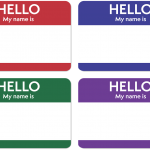It’s syllabus-writing time again, and once again I am perfecting, revising, and adding my own little flourishes to the always-growing documents of doom.
High on the list of paragraphs no one ever takes seriously, nor even (let’s be honest) reads, is the paragraph on cell phone etiquette.

Some version of this paragraph has appeared on every one of my syllabi since I began teaching:
Cell phone etiquette is something you’ll need to master if you want to be successful in your future employment, whatever it is. So I’m going to insist on it during our class. If you provide emergency services, have a dependent, or are in the midst of a personal emergency, please feel free to leave your phone on and accessible, though not actually on your desk. (Please alert me, if possible, so that I do not mistakenly mark you absent for rudeness.) If you receive a call or text that requires emergency attention, please quietly and quickly leave the room and attend to the emergency. Slip quietly back in if you can stay for the rest of class, but leave for the day if you need to.
In short, if someone in an ambulance needs you to drive it, sit in it with them, or pay for it later, you can check your phone when it demands your attention. Otherwise, it is not appropriate to consult your phone during our class. Also, permission to check messages doesn’t entail permission to answer any and all of them. If you’ve let me know that you’re waiting to hear about your grandmother’s heart surgery, you don’t need to answer your girlfriend’s text about what color tie you’re supposed to wear to the formal.
Alas, I have yet to conquer the monster.
But I thought it might be useful for those of you in a teaching, training, or parenting role to try to instill this basic distinction between emergency things, important things, and trivial things, and to give your charges permission (which is to say the capacity) to monotask the important things.
It also seems worth saying that discourtesy doesn’t justify discourtesy. In other words, if you’re not in a teaching, training, or parenting role, it’s a little rude to call out other people for checking their cell phones during meetings or visits or maybe even church.
Yes, there are people who are rude or too attached to their phones or not sufficiently aware of basic courtesy. But there are also people who have aging mothers or disabled sisters or small children or grown-but-medically-fragile children you don’t know about, or are in the midst of personal emergencies you aren’t privy to, or are unfairly but most definitely required by their employers to be on call at all times. A little grace goes a long way for people navigating hard situations.
And even if you’re in a supervisory role, you maybe could afford to presume (until and unless the situation really does get out of hand) that your supervisees are using their phones appropriately.
Go forth and practice courtesy one to another. Please.












